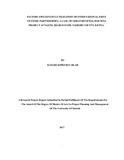| dc.description.abstract | The purpose of this study was to examine factors influencing the utilization of international joint venture partnerships in executing housing projects in Nairobi, Kenya. Kenya is experiencing rapid rural urban migration having a 4.2% increase every year. The total population living in the cities currently stands at twenty-two percent of the total (CIA World Fact book, 2010). To meet the demand for housing for this rate of population growth, Nairobi alone requires an annual supply of 120, 000 new housing units. The current annual supply is an average of 35,000 homes which means the deficit keep growing by 85,000 units per year. The National and County governments together with the private real estate developers have not been able to meet this demand because the construction projects are capital intensive. Hence the quest of getting a solution to the shortage of capital for implementing housing project, forms the objectives of this study which is to assess how legal, technological, political, economic and social-cultural factors influence utilization of joint venture partnerships in executing housing projects in Nairobi, Kenya. The study has used descriptive survey research design. The population target consisted of respondents from firms involved in the implementation of Urban renewal housing project in Ngong Road Estate, Nairobi. Stratified mode of sampling was used to obtain a sample of 30 respondents from construction contractors, land economists, quantity surveyors, engineers and architects. Data collection was done by administering questionnaires and interviewing respondents in the study. The data was cleaned, coded and entered into SPSS and analysis displayed in form of tables.
The study found that the legal factors strongly affect the utilization of the International Joint Ventures .However the amount of money required to register a joint Venture partnerships does not influence the establishment of the establishment of it. In regards to the economic factors, it was concluded that the economic indicators averagely affect the utilization of IJV in Kenya . The analysis also showed that incorporation of technology and automation of processes in real estate firms could significantly increase the utilization of IJV. The percentage of respondents who supported the relationship between the indicators and the IJV was significantly large and therefore the conclusion is that technology strongly affects the utilization of Joint Ventures in Kenya. | en_US |



